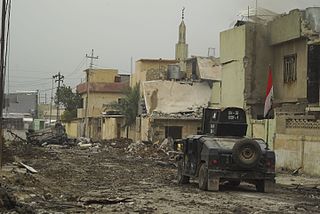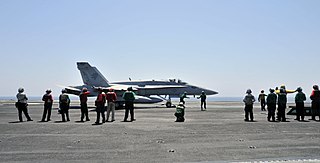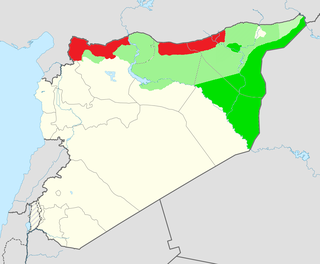Related Research Articles

Kata'ib Hezbollah, also known as the Hezbollah Brigades, is a radical Iraqi Shia paramilitary group which is a part of the Iraqi Popular Mobilization Forces (PMF), staffing the 45th, 46th, and 47th Brigades. During the Iraq War (2003–11), the group fought against Coalition forces. It has been active in the War in Iraq (2013–2017) and the Syrian Civil War. The group was commanded by Abu Mahdi al-Muhandis until he was killed in a US drone attack in 2020. Thereafter, Abdul Aziz al-Muhammadawi became the new leader of the PMF. The group seeks to establish an Iran-aligned government in Iraq, expel American forces from the country, and advance the regional and international interests of Iran in Iraq and the region. The group is responsible for killing hundreds of U.S. soldiers and takes a central part in carrying out attacks against U.S. targets in Iraq and acts as part of the Axis of Resistance. Kata'ib Hezbollah has received extensive training, funding, logistic support, weapons, and intelligence from the IRGC's overseas military-intelligence service Quds Force.

The Al-Qaeda insurgency in Yemen is an ongoing armed conflict between the Yemeni government, the United States and their allies, and al-Qaeda-affiliated groups in Yemen. It is a part of the Global War on Terror.

Many states began to intervene against the Islamic State, in both the Syrian civil war and the War in Iraq (2013–2017), in response to its rapid territorial gains from its 2014 Northern Iraq offensives, universally condemned executions, human rights abuses and the fear of further spillovers of the Syrian civil war. These efforts are called the war against the Islamic State (ISIS) or the international military intervention against the Islamic State (ISIS). In later years, there were also minor interventions by some states against IS-affiliated groups in Nigeria and Libya. All these efforts significantly degraded the Islamic State's capabilities by around 2019–2020. While moderate fighting continues in Syria, as of 2025, ISIS has been contained to a manageably small area and force capability.

The Islamic State – Algeria Province was a branch of the militant Islamist group Islamic State (IS), active in Algeria. The group was formerly known as Jund al-Khilafah fi Ard al-Jazair. Originally a faction of al-Qaeda in the Islamic Maghreb (AQIM), the group split from AQIM and pledged alliance to IS in September 2014. The group received noteriety later in the same month for the kidnapping and beheading of French citizen Hervé Gourdel. After a subsequent campaign by Algerian authorities killed many of its members and leaders, the group significantly declined in activity and effectively dissolved after May 2015.

On 15 June 2014 U.S. President Barack Obama ordered United States forces to be dispatched in response to the Northern Iraq offensive of the Islamic State (IS), as part of Operation Inherent Resolve. At the invitation of the Iraqi government, American troops went to assess Iraqi forces and the threat posed by ISIL.

Operation Inherent Resolve (OIR) is the United States military's operational name for the international war against the Islamic State, including both a campaign in Iraq and a campaign in Syria, with a closely related campaign in Libya. Through 18 September 2018, the U.S. Army's III Armored Corps was responsible for Combined Joint Task Force – Operation Inherent Resolve (CJTF—OIR) and were replaced by the XVIII Airborne Corps. The campaign is primarily waged by American and British forces in support of local allies, most prominently the Iraqi security forces and Syrian Democratic Forces (SDF). Combat ground troops, mostly special forces, infantry, and artillery have also been deployed, especially in Iraq. Of the airstrikes, 70% have been conducted by the military of the United States, 20% by the United Kingdom and the remaining 10% being carried out by France, Turkey, Canada, the Netherlands, Denmark, Belgium, Saudi Arabia, the United Arab Emirates, Australia and Jordan.

The Timeline of the War in Iraq covers the War in Iraq, a war which erupted that lasted in Iraq from 2013 to 2017, during the first year of armed conflict.
In late July 2015, the third phase of the Kurdish–Turkish conflict between various Kurdish insurgent groups and the Turkish government erupted, following a failed two and a half year-long peace process aimed at resolving the long-running conflict.
This article contains a timeline of events from January 2015 to December 2015 related to the Islamic State of Iraq and the Levant (ISIL/ISIS). This article contains information about events committed by or on behalf of the Islamic State, as well as events performed by groups who oppose them.

The Shirqat offensive, codenamed Operation Conquest or Operation Fatah, was an offensive against the positions of the Islamic State of Iraq and the Levant (ISIL) in and around the district of Al-Shirqat District to reach the city of Mosul.
The following lists events that happened during 2016 in Afghanistan.
Events in the year 2017 in Afghanistan.
Events in the year 2018 in Afghanistan.

The Islamic State insurgency in Iraq is an ongoing low-intensity insurgency that began in 2017 after the Islamic State (IS) lost its territorial control in the War in Iraq, during which IS and allied White Flags fought the Iraqi military and allied paramilitary forces.

The Eastern Syria insurgency is an armed insurgency being waged by remnants of the Islamic State of Iraq and the Levant (ISIL) and both pro and anti-Syrian government Arab nationalist insurgents, against the Autonomous Administration of North and East Syria (AANES), its military, and their allies in the US-led Combined Joint Task Force – Operation Inherent Resolve (CJTF–OIR) coalition.

The U.S. intervention in the Syrian civil war is the United States-led support of Syrian opposition and Rojava during the course of the Syrian civil war and active military involvement led by the United States and its allies – the militaries of the United Kingdom, France, Jordan, Turkey, Canada, Australia and more – against the Islamic State of Iraq and the Levant (ISIL) and al-Nusra Front since 2014. Since early 2017, the U.S. and other Coalition partners have also targeted the Syrian government and its allies via airstrikes and aircraft shoot-downs.

Starting on 17 October 2023, and in response to United States support for Israel in the Gaza war, Iran-backed militias initiated a coordinated series of more than 170 attacks on US military bases and assets in Syria, Iraq, and Jordan. These attacks resulted in injuries to dozens of US service members. In retaliation, the US has launched multiple counterattacks, resulting in the death of over 30 militants including a senior commander of the Nujaba Movement, Mushtaq Talib al-Saidi. In February 2024, following US airstrikes in Iraq and Syria, militia attacks against US forces were halted.
Events of the year 2024 in Iraq.
This is a timeline of Islamic State (ISIS)-related events that occurred in 2024.
References
- 1 2 "Iraqi and US forces kill a top IS commander and other militants in joint operation". AP News. 2024-09-13. Retrieved 2024-10-30.
- ↑ "Four Islamic State leaders killed in August raid in Iraq, U.S. says". The Washington Post . 14 September 2024. Retrieved 29 October 2024.
- 1 2 Schmitt, Eric (3 September 2024). "U.S. and Iraqi Commandos Targeted ISIS in Sprawling Operation". The New York Times . Retrieved 30 October 2024.
- ↑ "7 U.S. troops injured in raid with Iraqi forces targeting Islamic State group militants - CBS News". www.cbsnews.com. 2024-08-31. Retrieved 2024-10-30.
- ↑ Kube, Courtney and Helsel, Phil (2024-08-31). "15 Islamic State group fighters dead, at least 6 U.S. soldiers injured in raid on terror group in Iraq". NBC News. Retrieved 2024-10-30.
{{cite web}}: CS1 maint: multiple names: authors list (link) - ↑ Kim Hjelmgaard (1 September 2024). "U.S.-led raid against Islamic State group in Iraq kills 15 'operatives'". USA Today . Retrieved 1 September 2024.
- ↑ "7 US troops hurt in a raid with Iraqi forces that left 15 suspected militants dead". AP News. 2024-08-31. Retrieved 2024-10-30.